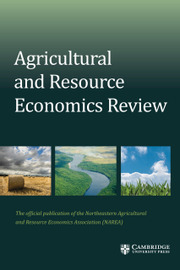Crossref Citations
This article has been cited by the following publications. This list is generated based on data provided by
Crossref.
Vásquez, William F.
2017.
Understanding bottled water consumption in a high‐poverty context: empirical evidence from a small town in Guatemala.
International Journal of Consumer Studies,
Vol. 41,
Issue. 2,
p.
199.
Rosinger, Asher Y
Herrick, Kirsten A
Wutich, Amber Y
Yoder, Jonathan S
and
Ogden, Cynthia L
2018.
Disparities in plain, tap and bottled water consumption among US adults: National Health and Nutrition Examination Survey (NHANES) 2007–2014.
Public Health Nutrition,
Vol. 21,
Issue. 8,
p.
1455.
Graydon, Ryan Christopher
Gonzalez, Paola Andrea
Laureano-Rosario, Abdiel Elias
and
Pradieu, Guillermo Reginald
2019.
Bottled water versus tap water.
International Journal of Sustainability in Higher Education,
Vol. 20,
Issue. 4,
p.
654.
Beecher, Janice
Redican, Kyle
and
Kolioupoulos, Megan
2020.
(Mis)Classification of Water Systems in the United States.
SSRN Electronic Journal ,
Barnes, Jesse L.
Krishen, Anjala S.
and
Hu, Han-fen
2021.
Untapped Knowledge about Water Reuse: the Roles of Direct and Indirect Educational Messaging.
Water Resources Management,
Vol. 35,
Issue. 8,
p.
2601.
Rosinger, Asher Y
2022.
Using Water Intake Dietary Recall Data to Provide a Window into US Water Insecurity.
The Journal of Nutrition,
Vol. 152,
Issue. 5,
p.
1263.
Bradley, Paul M.
Romanok, Kristin M.
Smalling, Kelly L.
Focazio, Michael J.
Evans, Nicola
Fitzpatrick, Suzanne C.
Givens, Carrie E.
Gordon, Stephanie E.
Gray, James L.
Green, Emily M.
Griffin, Dale W.
Hladik, Michelle L.
Kanagy, Leslie K.
Lisle, John T.
Loftin, Keith A.
Blaine McCleskey, R.
Medlock–Kakaley, Elizabeth K.
Navas-Acien, Ana
Roth, David A.
South, Paul
and
Weis, Christopher P.
2023.
Bottled water contaminant exposures and potential human effects.
Environment International,
Vol. 171,
Issue. ,
p.
107701.
Alzahrani, Fahad
Erfanian, Elham
and
Collins, Alan R.
2023.
Drinking water contamination and avoidance behavior: do bottled water sales adequately measure the cost of this behavior?.
Urban Water Journal,
Vol. 20,
Issue. 1,
p.
112.
Bradley, Paul M.
Romanok, Kristin M.
Smalling, Kelly L.
Gordon, Stephanie E.
Huffman, Bradley J.
Paul Friedman, Katie
Villeneuve, Daniel L.
Blackwell, Brett R.
Fitzpatrick, Suzanne C.
Focazio, Michael J.
Medlock-Kakaley, Elizabeth
Meppelink, Shannon M.
Navas–Acien, Ana
Nigra, Anne E.
and
Schreiner, Molly L.
2025.
Private, public, and bottled drinking water: Shared contaminant-mixture exposures and effects challenge.
Environment International,
Vol. 195,
Issue. ,
p.
109220.


